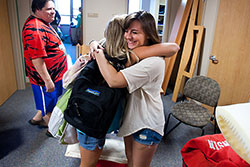Roommate Relationships

The Division of University Housing welcomes more than 7,400 new students to the residence halls every year, and the staff understands that roommates are often a hot topic of conversation. Parents are a student’s first sounding board regarding roommate relationships, so your thoughtful guidance can equip your student to navigate one of the most exciting dynamics of starting college. The Assignment Office and Residence Life staffs support many students and families with establishing and maintaining successful roommate relationships.
Overall, we recommend five steps to help your student address just about any roommate situation that may arise:
- Listen.
- Ask your student clarifying questions to get to the root of their worries. For example: “Is there something specific that has you worried?”
- Practice communicating.
- Allow your student to address the situation.
- Give him or her time to work through a solution.
Here are some commonly asked questions and suggestions for how families can best aid their students in navigating roommate relationships.
Q: How can students connect with their roommates?
A: University Housing provides residents with the roommate’s name, email, phone number, and home address. This information can be found when a student logs into the My UW Housing portal. Some students may also choose to learn about their roommate through social media. While this is one step in developing a new roommate relationship, we recommend also having your student contact his or her roommate directly through email, phone, or video chat. Please encourage your student to remember that social media profiles are not always the most accurate representation of a whole individual. Initial concerns are often dispelled through direct contact between two students. Remind your student to be open-minded. Part of being a college student is meeting different types of people. Keep in mind that during the summer some students have limited access to email or may be away on vacation or for work. Your student should allow his or her roommate time to respond. Read more on our website about getting the conversation started.
Q: What if a roommate is abroad and cannot talk on the phone?
A: Whether the new roommate is across the world or just across town, we recommend video chatting as a way to put a face with a name. Many free, easy-to-use applications, such as Skype, GChat, and Facetime, will make it possible for your student to get to know his or her new roommate.
Q: What if my student is unhappy with his or her roommate?
A: Please keep in mind that roommate pairs must be able to respect each other and the “home” they will share; they are not required to formulate a mandatory best-friend relationship. Roommate pairs are successful when they have built a foundation of respect and consideration for one another. We recommend that before making any rash judgments, students should reach out to the new roommate for a phone or video conversation to get to know one another. To best facilitate the harder questions, all residents in University Housing will complete a roommate agreement once they arrive on campus. The roommate pair will sit down with the help of their House Fellow to talk through this agreement together. We understand that this may be the first time that many residents are sharing a room and have to communicate about their living needs, so the roommate agreement asks very specific questions about sleep, studying, cleanliness, guests, and personal belongings. This serves as a “living document” to be revisited throughout the year as the relationship grows and as needs change.
Q: Who can assist if there is a conflict between roommates?
A: In all healthy relationships, there may be some conflicts, and learning to communicate through them helps the relationship grow deeper. Upper-class House Fellows (RAs) are a great first resource for residents who need another student perspective or some extra guidance on how to approach a roommate with a concern. We also have full-time professional staff who have master’s degrees and who live in the halls and supervise the House Fellows; they can help with especially intense conflict mediation.
Q: Do you allow roommate changes over the summer?
A: We do not allow students to switch room assignments over the summer. Remember that a lot of monumental changes are happening in your student’s life right now. High school graduation and making the transition to the university with a new and diverse set of students can all seem to be happening quickly. Please encourage your student to remember that relationships can take time to develop. There is no need to rush the process. The Assignment Office will begin maintaining an official waiting list for room changes on September 3, 2013. To join the waiting list, students should visit the Assignment Office in the lower level of Slichter Hall. Room changes are offered throughout the semester on a first-come, first-served basis as space becomes available.
Q: Can roommates choose to live together again?
A: Absolutely! We allow students greater flexibility to choose their rooms online when returning to the University Residence Halls for their sophomore year. They can choose the same room together or two single rooms right next door to each other.
Q: Who can my student contact with more specific questions?
A: Students can call, e-mail, or stop by the University Housing Office. And the office is happy to provide talking points to parents, too. For Residence Life contact information, visit each hall’s web page on the University Housing website. To reach the Assignment Office team, email assignme@housing.wisc.edu.